|
|
|
Sort Order |
|
|
|
Items / Page
|
|
|
|
|
|
|
| Srl | Item |
| 1 |
ID:
101168
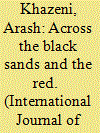

|
|
|
|
|
| Publication |
2010.
|
| Summary/Abstract |
Through a reading of 19th-century Persian travel narratives, this article locates the history of Iran and Central Eurasia within recent literature on global frontier processes and the encounter between empire and nature. It argues that Persianate travel books about Central Eurasia were part of the imperial project to order and reclaim the natural world and were forged through the material encounter with the steppes. Far from a passive act of collecting information and more than merely an extension of the observer's preconceptions, description was essential to the expansion and preservation of empire. Although there exists a vast literature on Western geographical and ethnographic representations of the Middle East, only recently have scholars begun to mine contacts that took place outside of a Western colonial framework and within an Asian setting. Based on an analysis of Riza Quli Khan Hidayat's Sifaratnama-yi Khvarazm, the record of an expedition sent from the Qajar Dynasty to the Oxus River in 1851, the article explores the 19th-century Muslim "discovery" of the Eurasian steppe world. The expedition set out to define imperial boundaries and to reclaim the desert, but along the way it found a permeable "middle ground" between empires, marked by transfrontier and cross-cultural exchanges.
|
|
|
|
|
|
|
|
|
|
|
|
|
|
|
|
| 2 |
ID:
126174
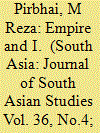

|
|
|
|
|
| Publication |
2013.
|
| Summary/Abstract |
Framed in a discussion of post-colonial approaches to the British Empire's influence on culture, a close reading of Captain Donald Campbell's late eighteenth-century travelogue contextualises the personal particularities in his assessments of Habsburg Europe, Ottoman West Asia and Mysorean/British South Asia. His is an imagination in which the bonds of 'religion' ameliorate the 'otherness' of continental Europeans, while his concept of 'enlightenment' learning is deployed to understand the Ottomans. Only in the case of South Asia is the very humanity of the 'other' denied. I argue that this landscape of otherness reflects the coincidence of the interests of his 'self' and the 'Empire', which overlap most thoroughly in South Asia. Campbell's travelogue is of value to post-colonial approaches, as it is a particularly poignant example of the manner in which the particularities of the 'self' contribute to the construction of broader cultural discourses permeated by 'Empire'.
|
|
|
|
|
|
|
|
|
|
|
|
|
|
|
|
| 3 |
ID:
139245
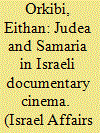

|
|
|
|
|
| Summary/Abstract |
This article argues that Israeli documentary cinema represents Judea and Samaria as an oriental space. An analysis of some prominent films reveals common conventions used by filmmakers in the cinematic representations of the region. These conventions establish a series of distinctions between ‘here’ and ‘there’, such as domestic versus foreigner, familiarity versus strangeness, safety versus danger, and belonging versus alienation. The orientalization of Judea and Samaria is considered here as a rhetorical strategy that enables filmmakers to perform a cultural construction of the region as a colonized landscape.
|
|
|
|
|
|
|
|
|
|
|
|
|
|
|
|
| 4 |
ID:
175481
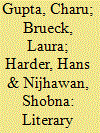

|
|
|
|
|
| Summary/Abstract |
This collection brings together nine essays, accompanied by nine short translations, that redraw the boundaries of literary histories both temporally and spatially. The essays, rooted in the humanities and informed by interdisciplinary area studies, explore multiple linkages between forms of print culture, linguistic identities and diverse vernacular literary spaces in colonial and post-colonial South Asia. The essays and translations foreground complex and politicised expressions of gender and genre in fictional and non-fictional print materials and thus draw meaningful connections between the vernacular and literature, the everyday and the marginals, and gender and sentiment. Collectively, they expand vernacular literary archives, canons and genealogies, and push us to theorise the nature of writing in South Asia.
|
|
|
|
|
|
|
|
|
|
|
|
|
|
|
|
| 5 |
ID:
175484
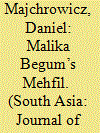

|
|
|
|
|
| Summary/Abstract |
Ostensibly, Muslim women in colonial India only rarely wrote travel narratives, particularly in Urdu. In truth, women’s travel writing in Urdu is anything but chimerical, but persistent archival and methodological limitations have led to the neglect and even irrevocable loss of this writing. A recalibrated approach to travel writing and archival practices divulges a vast corpus—but only if we attend to the specific ways in which women’s narratives were produced and circulated. This article offers a primary typology of the formats and fora most often employed by women writing in Urdu, including semi-private (but orally consumed) letters, family newspapers and women’s journals. Using extensive quotations from previously unknown sources, it reintroduces a forgotten corpus to the study of Indian history, literature, and gender studies alike.
|
|
|
|
|
|
|
|
|
|
|
|
|
|
|
|
| 6 |
ID:
175483
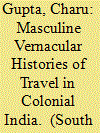

|
|
|
|
|
| Summary/Abstract |
This article focuses on vernacular travel writings on America and Europe by Swami Satyadev ‘Parivrajak’ (1879–1961), one of the first persons to systematically write travelogues in Hindi. I argue that Parivrajak’s travel literature was part of a colonised nation’s attempt to reclaim a space of freedom, forged through the carving of ‘perfect masculine bodies’, which embodied his ideals of beauty and pleasure. It was a performative, political act that inscribed gendered landscapes with a dialogue between East and West, slavery and freedom. The Hindu male’s subaltern masculinity had to be overcome through diverse means, all of which metaphorically interacted to shape Parivrajak’s writings.
|
|
|
|
|
|
|
|
|
|
|
|
|
|
|
|
| 7 |
ID:
131408
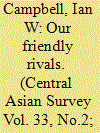

|
|
|
|
|
| Publication |
2014.
|
| Summary/Abstract |
The short-lived Emirate of Kashgaria was of strategic and commercial interest to both the Russian and British Empires. However, a close examination of the publications produced by the Russian and British missions to its ruler, Ya'qub Beg, militates against interpreting these missions as merely another episode of the Great Game, the century-long struggle for influence in Central and High Asia. Rather, Russian and British diplomats and travellers participated in a common culture of exploration, sharing a purpose and a European identity. This self-identification, in turn, was closely connected with the practice of exploration: objective measurement and scientific inquiry were coded as activities differentiating Russian and British travellers from the objects of their study. Although the information so gathered had political and strategic utility, the international networks and common values involved in its production established a network of mutual interests, respect, and cooperation even during moments of heightened geopolitical tension.
|
|
|
|
|
|
|
|
|
|
|
|
|
|
|
|
| 8 |
ID:
177797
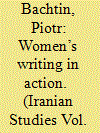

|
|
|
|
|
| Summary/Abstract |
This paper examines the textual and performative functions of early women’s writings on the example of three accounts of the pilgrimage to Mecca written during the Qajar era by Mehrmāh Khānom ʿEsmat al-Saltaneh (1880–81), the anonymous Hājiyeh Khānom ʿAlaviyeh Kermāni (1892–94), and Sakineh Soltān Vaqār al-Dowleh Esfahāni Kuchak (1899–1901). It ponders on the relationships between the female writers and textuality, their readers and, finally, the diary personas they created. It claims that their writings emerged in the process of negotiating the then existing, masculine models of textuality and authorial authority. By rejecting the monologic authoritativeness of literature and textuality, the women diarists transformed their texts into a space for dialogue—including dialogue with themselves.
|
|
|
|
|
|
|
|
|
|
|
|
|
|
|
|
|
|
|
|
|